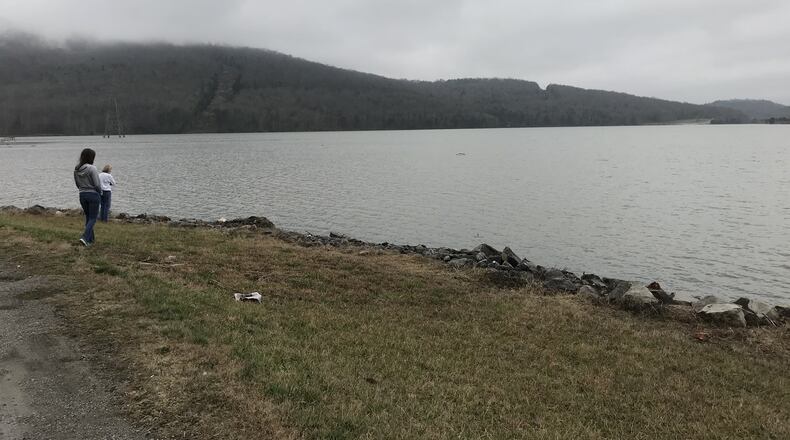Look out, Tennessee. Georgia wants its northern border back.
Georgia legislators are renewing a 200-year-old fight to reclaim a narrow strip of border land — and access to fresh drinking water from the Tennessee River that could quench metro Atlanta’s undying thirst.
The border has been mapped incorrectly since 1818, when surveyors mistakenly set the line between the states about 1 mile south of where it should be. To this day, the border seen on every U.S. map remains based on the inaccurate survey instead of the 35th parallel, where Congress intended it to be when Tennessee became a state in 1796.
While skeptics view Georgia's quest as little more than a pipe dream, state lawmakers are serious.
The Georgia General Assembly approved a resolution this year to form a delegation to negotiate the “true border” with Tennessee. If diplomacy fails, Georgia could take its case to the U.S. Supreme Court.
"I just want to threaten them and then stick a straw into the Tennessee River," state Senate President Pro Tempore Butch Miller, R-Gainesville, said during a hearing this month.
Georgia legislators have made clear they aren’t attempting to annex the entire 51-mile stretch of misplaced land, which covers about 30,000 residents and part of the city of Chattanooga. That’s just a starting point for negotiations.
What Georgia really wants is a piece of Nickajack Lake near the state’s northwest border. If part of that lake, fed by the Tennessee River, were included within Georgia, the state could run a pipe and suck water out.
Brad Carver, a water rights attorney, said the Tennessee River has 1 billion gallons per day of excess capacity — nearly double the amount consumed daily by metro Atlanta’s 15-county water district.
“It is truly the long-term water supply solution to the state of Georgia,” said Carver, who served as a special executive counsel to Sonny Perdue when he was governor. “There’s a definite demand in metro Atlanta, and this would be a way to supply that demand.”
Of course, it’s not that easy.
Tennessee would have something to say about Georgia’s land grab.
“It’s our land and it’s our water,” said Tennessee Rep. Jason Powell, D-Nashville. “We have held and possessed it for 200 years now. It’s unfortunate that Georgia, and specifically Atlanta, has not managed their growth properly to deal with water issues.”
Georgia has fought this border battle many times before. It has never won, nor has it ever given up its claim.
State legislators have passed several resolutions to negotiate the Tennessee line since 1887. Those efforts go nowhere. In a memorable peace offering, Chattanooga's mayor sent a truckload of bottled water to the Georgia General Assembly in 2008.
Still, supporters of Georgia’s case believe the state is on solid legal ground if it truly wanted to push the issue. Carver said Georgia’s continual attempts to raise the issue over the years would overcome arguments that it surrendered its rights to the land.
Georgia needs more water sources, said Joanna Cloud, the executive director for the Lake Lanier Association. Lake Lanier feeds into the Chattahoochee River, the water supply for the Atlanta area.
In the previous eight years, Lake Lanier has been at full pool in the summer less than 14 percent of the time, she said.
“We’re teetering on having a really tough situation coming at us in terms of water supply,” Cloud said. “We need to be looking for more water resources. How viable is it for Tennessee to give us that land? I don’t know.”
Georgia is also fighting a separate drawn-out water war with Florida, including a case now before the U.S. Supreme Court.
But even if Georgia wins a favorable ruling from the high court, which is expected to rule in the coming months, the state’s population and demand for water will continue to grow.
State Rep. Marc Morris said Georgia should recoup some of its water from Tennessee. More than 1.5 billion gallons a day drains from Georgia to Tennessee, he said.
“This is no different from someone coming over and sticking their hands in our cash register,” said Morris, a Republican from Cumming. “When we go into another drought, this is going to be a critical situation and we need to plan for it now.”
Under Georgia's proposal, Senate Resolution 794, a six-person commission will be formed to meet with similar commissioners from Tennessee and North Carolina to survey and establish the border.
That meeting is unlikely to ever occur. Georgia’s northern neighbors aren’t eager to revive the issue, and Georgia’s commission will be abolished Dec. 1, according to the resolution.
If the cold border war remains unresolved, Georgia lawmakers could vote on a similar resolution again next year. And perhaps in future years as well.
The story so far
Previously: Surveyors incorrectly drew the border between Georgia and Tennessee in 1818, leading to 200 years of boundary disputes.
What's new: Georgia lawmakers passed a resolution calling for the state's to negotiate the border. They want Georgia residents to have access to water from the Tennessee River.
What's next: Georgia's attempt to change the border is unlikely to go far unless the state brings its case against Tennessee to the U.S. Supreme Court.
Never miss a minute of what’s happening in Georgia Politics. Subscribe to PoliticallyGeorgia.com.
About the Author
Keep Reading
The Latest
Featured






